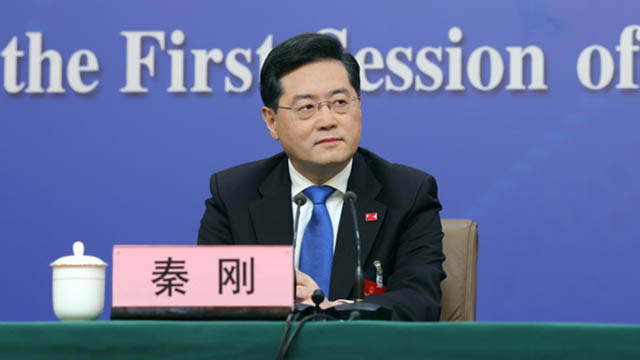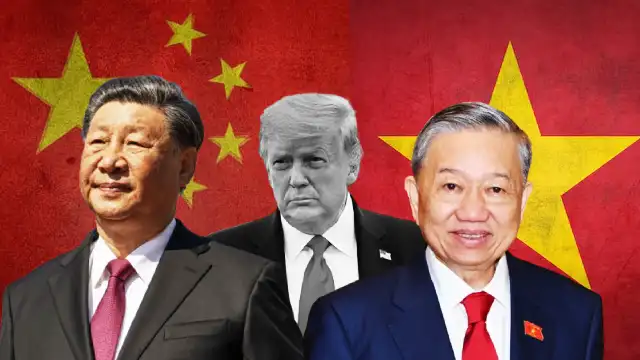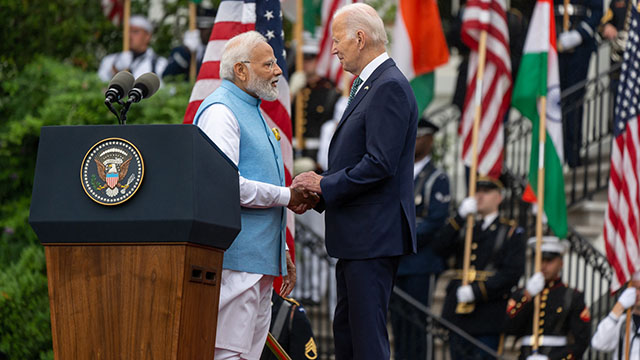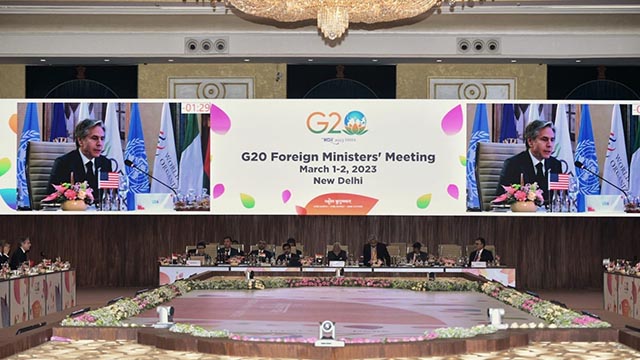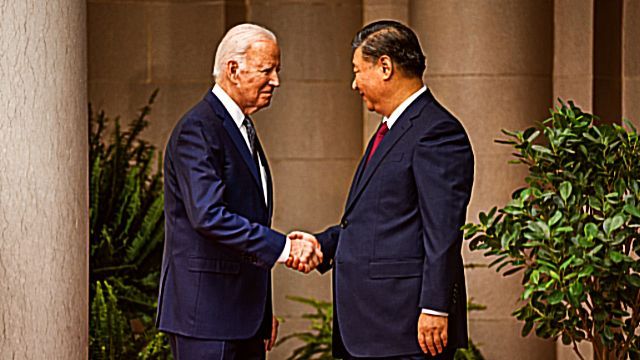The new Chinese Foreign Minister Qin Gang has bashed the US for stirring up confrontation in the so-called ‘Indo-Pacific’ war theatre, conceived by the Pentagon, and accused it of ganging up with local powers to militarily bully China. Qin specifically targeted the four-nation Quadrilateral Security Dialogue (Quad) meeting that recently took place in New Delhi soon after the G20 Foreign Ministers’ Meeting.
Speaking at a press conference at the margins of the First Session of the 14th National People’s Congress, which is China’s largest parliamentary session attended by thousands of elected lawmakers, Qin targeted the US and the Quad while discussing China’s foreign policy and external relations.
Accusing the US of locking China in a “zero-sum game”, the foreign minister said, “The United States claims that it seeks to ‘out-compete’ China but does not seek conflict. Yet in reality, its so-called ‘competition’ means to contain and suppress China in all respects and get the two countries locked in a zero-sum game.”
He compared the US’s rhetoric on “following rules” with unfair competition practices. Qin said, “imagine two athletes competing in an Olympic race. If one athlete, instead of focusing on giving one’s best, always tries to trip or even injure the other, that is not fair competition, but malicious confrontation and a foul! Its so-called “establishing guardrails” for China-US relations and ‘not seeking conflict’ actually means that China should not respond in words or action when slandered or attacked. That is just impossible!”
Qin criticised the US’s attitude vis-à-vis China and said that the US must control itself. “If the United States does not hit the brake but continues to speed down the wrong path, no amount of guardrails can prevent derailing, and there will surely be conflict and confrontation. Who will bear the catastrophic consequences? Such competition is a reckless gamble with the stakes being the fundamental interests of the two peoples and even the future of humanity”, Qin said.
Answering a question by a Xinhua reporter on the US-led Quad and Pentagon’s ‘Indo-Pacific’ war theatre, Qin accused Washington DC of ganging up against the People’s Republic of China.
Qin said: “The US Indo-Pacific Strategy, while purportedly aiming at upholding freedom and openness, maintaining security and promoting prosperity in the region, is, in fact, an attempt to gang up to form exclusive blocs, to provoke a confrontation by plotting an Asia-Pacific version of NATO, and to undermine regional integration through decoupling and cutting chains.”
Alleging that the US is involved in developing an entente against China, to militarily encircle it, Qin said, “The US claim to ‘shape the strategic environment in which China operates’ actually reveals the real purpose of its Indo-Pacific Strategy, that is, to encircle China. Such an attempt will only disrupt the ASEAN-centered, open and inclusive regional cooperation architecture, and undermine the overall and long-term interests of regional countries. It is bound to fail.”
Although apparently due to India’s inhibitions, the Quad resolution refrained from mentioning China by name, it referred to the South and East China Seas as a trouble spot to take a potshot at Beijing.
The resolution of the Quad foreign ministers’ meeting in New Delhi says, “We reiterate the importance of adherence to international law, as reflected in the UN Convention on the Law of the Sea (UNCLOS), to meet challenges to the maritime rules-based order, including in the South and East China Seas. We strongly oppose any unilateral actions that seek to change the status quo or increase tensions in the area. We express serious concern at the militarization of disputed features, the dangerous use of coast guard vessels and maritime militia, and efforts to disrupt other countries’ offshore resource exploitation activities.”
China has been exerting its sovereign rights in its territorial water in the South and East China Seas. However, China’s exercise of sovereignty challenges the hegemonistic position enjoyed hitherto by the US on the seas. Thus, the US has been provoking a confrontation with China on the issue of the South and East China Seas, which are thousands of nautical miles away from the American coasts.
The Quad was initially designed to build a stronger military coalition in the region to bully China, but the rapid change in the world’s geopolitical equations robbed the US of its steam and capability to single-handedly deal with China. Thus, the US is now even depending on the pro-West ASEAN countries to build a strong anti-China entente.
Stating that the Quad supports ‘ASEAN centrality and unity’, the US-led military bloc has tried taking a step closer towards provoking a confrontation between the ASEAN and China. The resolution said, “…we remain committed to supporting implementation of the ASEAN Outlook on the Indo-Pacific (AOIP) and will be guided in our work by ASEAN’s principles and priorities.”
The resolution also said that Quad members “are committed to further strengthening our respective relationships with ASEAN, thus creating a platform for greater Quad collaboration in support of the AOIP.”
Criticising the Quad’s ASEAN policy, Qin said, “I noticed that leaders of a number of regional countries have recently stated that ASEAN should not be a proxy for any party and should stay clear from big power rivalry. As a pacesetter in global development, Asia should be a stage for win-win cooperation rather than a chessboard for geopolitical contest. No Cold War should be reignited, and no Ukraine-style crisis should be repeated in Asia.”
Qin’s remarks on the Quad came a few days after Russian Foreign Minister Sergei Lavrov criticised the coalitions formed by the US in Asia to disrupt peace and stability by provoking hostility against China. Lavrov accused these coalitions like the Quad and the Australia-UK-US (AUKUS) are trying to militarise the region.
During the Raisina Dialogue conference held in New Delhi on March 3rd, following the Quad foreign ministers’ meeting, Lavrov said, “The idea promoted by our American colleagues, ASEAN plus Quad, is openly aimed at ruining the East Asia Summit. In other words, it would be the East Asia Summit minus China and minus Russia.”
Lavrov had underscored the importance of the Russia-India-China partnership for an emerging multi-lateral world order. He said that Russia stands for India and China’s better relationship, which goes against the US policy of involving these two giants in Asia to fight with each other.
Recently, Indian foreign policy has started advocating a multi-lateral world order. Even Indian Prime Minister Narendra Modi, who was once a vocal advocate of the Quad and stronger ties with the US, pitched for multilateralism while addressing the foreign ministers of the G20 countries in New Delhi.
If India’s tumultuous situation prevails, the US’s efforts to consolidate its hegemony in the Indian Ocean region will suffer. Moreover, if India, following Russia’s encouragement, strengthens its relationship with China, with which its bilateral trade has been growing despite hiccups in ties, then the Quad programme may fail in Southeast Asia.
It’s yet to be seen how the Chinese confront the US-led Quad’s expansion drive and how it handles the attempts to put the ASEAN bloc against Beijing in Asia. Qin’s and Lavrov’s criticisms show that both China and Russia consider the Quad as a prototype of NATO in the east. How both persuade India to quit this zero-sum game equation and partner in building a stronger economic zone in the east will decide the future course of the entire region.
Tanmoy Ibrahim is a journalist who writes extensively on geopolitics and political economy. During his two-decade-long career, he has written extensively on the economic aspects behind the rise of the ultra-right forces and communalism in India. A life-long student of the dynamic praxis of geopolitics, he emphasises the need for a multipolar world with multilateral ties for a peaceful future for all.

